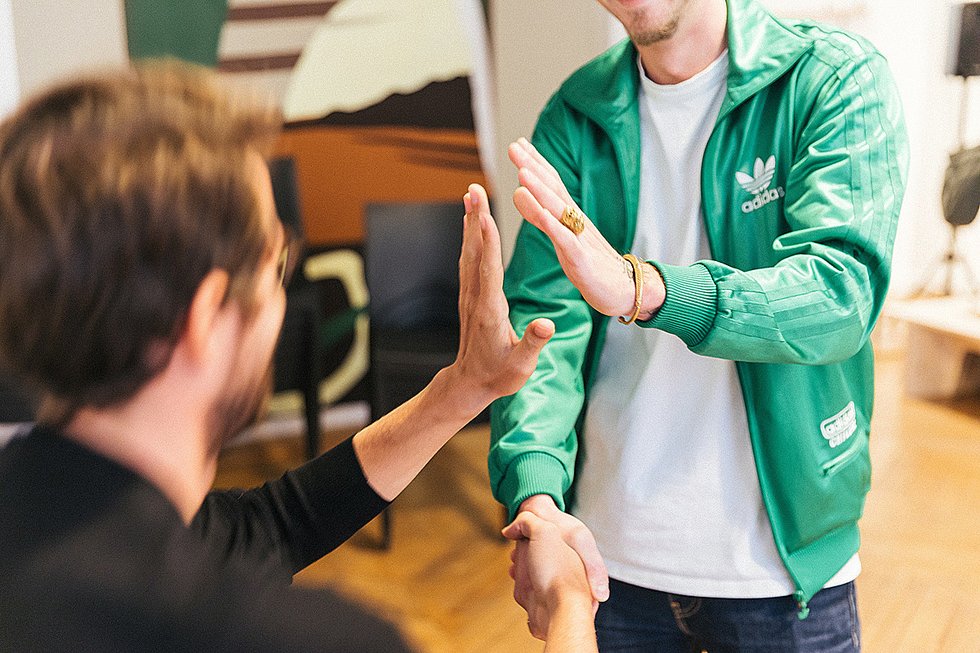Saying thank you at work: gratitude or manipulation?
Mar 03, 2020
5 mins


Journaliste
As more and more people embrace positive thinking at work, many employees are finding themselves drowning in thank yous.
“Thank you for responding to my email.”
“Thank you for thinking about Monday’s report.”
“Thank you for finishing the PowerPoint presentation before leaving for the weekend.”
Saying thank you has become such a banal act, it is barely taken seriously. It is much like the “How are you?” from colleagues arriving at the office in the morning. Earbuds in place, they shoot by without waiting for an answer. Yet these two words can be very beneficial when used at the right moment. What is hiding behind this deceptively trivial pronouncement? Is it just an expression of basic manners? Or is it an attempt at manipulation? Or could it be sincere gratitude? Let’s take a closer look.
The origins of thanks
The casual, polite custom of saying thank you seems to have originated in commercial interactions. The French merci comes from the Latin merces, meaning compensation for work. Italians say grazie, which derives originally from another Latin phrase, gratias agere, an expression of gratitude. In any language, thanking someone is a polite, respectful and gracious act.
If we take a closer look at the origins of the word gratitude, we see that gratus means pleasing — a word that is closely linked to wellbeing. Courtney E. Ackerman explained the effects of the feeling in her article What is gratitude and why is it so important? “Acts of gratitude can be used to apologize, make amends and help solve other problems. Alternatively, people may feel gracious because it can be an intrinsically rewarding process. Simply being grateful for being alive is a great way to motivate oneself to seize the day.”
The (almost) magical powers of ‘Thank you’
Gratitude begins with being able to say the words, “Thank you”. By studying its effects, we can see the many benefits in action.
Being mindful of health and wellness
When a coworker or supervisor gives you recognition and support, you probably feel your work is more meaningful. This can translate into increased motivation and a better atmosphere at work. Jean-Philippe Bouchard, president of the personal development and training centre Spiralis, explained the positive effects of gratitude and saying thank you as “drawing attention to what is positive around you, even though we are naturally conditioned to see what is wrong”.
This can have a positive effect on health as well. An American study cited in the Health Behavior and Policy Review showed that people who willingly express gratitude double their ability to maintain their cardiovascular health. That is why you may feel like hugging your boss in thanks when you receive that well-earned bonus.
Making the workplace more human
“In a world where humans are often replaced by machines, it’s a good thing to call attention to the investment… of each team member” - Claude, former restaurant manager
Some modern businesses try to make their employees feel special by giving them cool outdoor spaces, pinball machines or happiness managers. The current trend is to focus on developing human relations. This usually begins with looking at what an individual brings to their job. Claude, a former restaurant manager, thinks that saying thank you is a basic key to relationships. “Of course, we could be content with carrying out our job without further expectation, but that’s at the expense of any dialogue. In a world where humans are often replaced by machines, it’s a good thing to call attention to the investment and successes of each team member.” Sandrine, a nutritionist in an agri-food company, agreed. She said that when her supervisor thanks her, they are showing consideration for her. *“For me, what it really says is ‘I am aware of who you are. You aren’t just a piece of machinery. Of course, it’s my job, and I don’t have to be thanked for doing it, but it is always good to hear it. We aren’t robots!”
Saying thank you is more than just acknowledging someone for doing their job. It is also showing respect for them. If we think of work in a purely contractual manner, gratitude may seem a bit over the top. Yet, a few words of thanks often imply that the work has been done well, which is satisfying for the person who did it. *“This shows that I have an impact on the company. I find that rewarding. I like to know that the coworker I helped out on a project doesn’t take it for granted, or that my boss is thanking me sincerely when I go beyond my quarterly goals.”
Can recognition only come from thanks?
Some people think that saying thank you at work is superfluous. One of these is Eric, who works in HR at an event-planning agency. “It always seems ill-timed or inappropriate. I’m just doing my job. No one needs to thank me for that. It feels like someone is making fun of me. I don’t have a choice as to whether I want to do what is asked of me or not! I want more than just ‘thanks’ to feel appreciated.” Eric’s views show that being thanked is not enough for everyone. Some people want other forms of recognition. People also truly appreciate words of encouragement, showcasing a successful project, development of a closer relationship, or a raise.
Without recognition, people at all levels in a business can lose motivation and momentum. Keep in mind that you might have to do more than say thanks to acknowledge a coworker’s value.
When gratitude becomes contorted
A feeling of debt or sincere gratitude
Many anthropologists, including Marcel Mauss, suggest that the expression of gratitude elicits reciprocation. In the end, if we thank a coworker, team or manager, the assumption is that we are beholden to them.
This leads to a key question: Can we experience gratitude simultaneously with indebtedness? Shueh-Chin Ting, in an article in the American International Journal of Contemporary Research, does not believe we can. “Those with gratitude tend to feel more positive emotions. On the contrary, those with external indebtedness tend to feel more negative emotions.”
Distortion and manipulation
Authentic recognition comes with no strings attached. Saying thanks to get something in return cheapens the words and raises the question of manipulation. Sylvie, who has been a salesperson in a large French company for more than a year, explains how her employer uses this tactic to make her work harder. “I was happy my work was appreciated, encouraged and valued. They thanked me all the time for being at the top of my game. But at the end of the day, it was simply a way to keep me there. They gave me more and more responsibilities, and thanked me for the quality of my work, but I never got a raise.”
Sylvie is disillusioned and plans to leave her job. “The flattery and thanks gave me the mistaken feeling of being important. I realized that they buttered me up so that I always worked harder, but they didn’t put their money where their mouth is.”
This practice is not very surprising when we understand the impact of recognition on employee commitment. Compliments, sensitivity and encouragement create a privileged relationship that encourages employees and managers to do their best, though at times the methods used may be insincere. Calculated attempts to overpraise a coworker will only produce a toxic environment. “You can’t pretend to create togetherness. Even if I like to feel valued, I can sense when I’m being duped!” Sandrine said.
Gratitude requires spontaneity without calculation, strategy or manipulation. So let’s get rid of the automatic responses and nasty ploys—and make way for authentic recognition.
Translated by Mary Moritz
Photo: WTTJ
Follow Welcome to the jungle on Facebook to get your daily dose of our best articles in your timeline!

More inspiration: Working with colleagues

The 5 coworkers you’ll meet during the holiday season
'Tis the season for holiday personas! From The Grinch to Buddy the Elf, spot the 5 festive coworkers in your office. Who’s who this year?
Dec 17, 2024

Office holiday parties: Networking goldmine or overhyped obligation?
Should you attend your work holiday party? Discover the pros, cons, and tips to decide if it’s worth your time this year.
Dec 03, 2024

9 signs your office could be a sitcom
Whether it’s a quirky boss, demanding clients, or a workplace villain, these characters exist in every office. Grab your popcorn and see who’s who!
Nov 07, 2024

The office lunch break debate: Social bonding or solo recharge?
Lunch breaks are essential for more than just eating—they can boost creativity, connections with your team, and productivity.
Nov 05, 2024

Dealing with a narcissistic coworker? Here’s how to survive
Overworked and overlooked by a narcissistic coworker? Learn how to spot the signs, set boundaries, and keep your sanity intact.
Oct 30, 2024
The newsletter that does the job
Want to keep up with the latest articles? Twice a week you can receive stories, jobs, and tips in your inbox.

Looking for your next job?
Over 200,000 people have found a job with Welcome to the Jungle.
Explore jobs